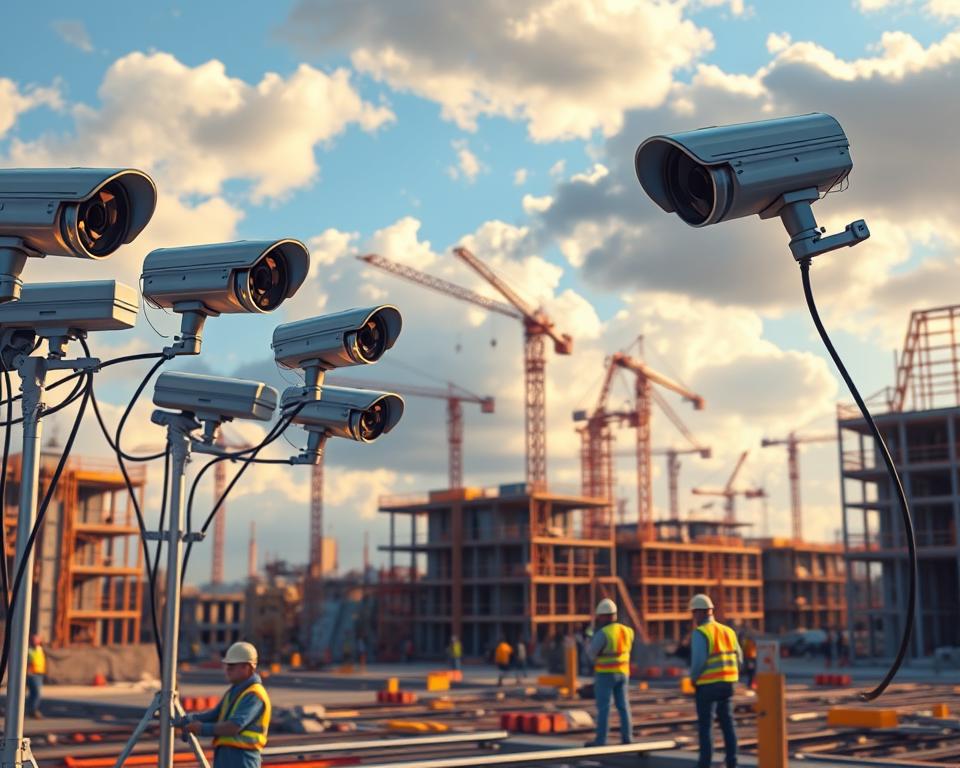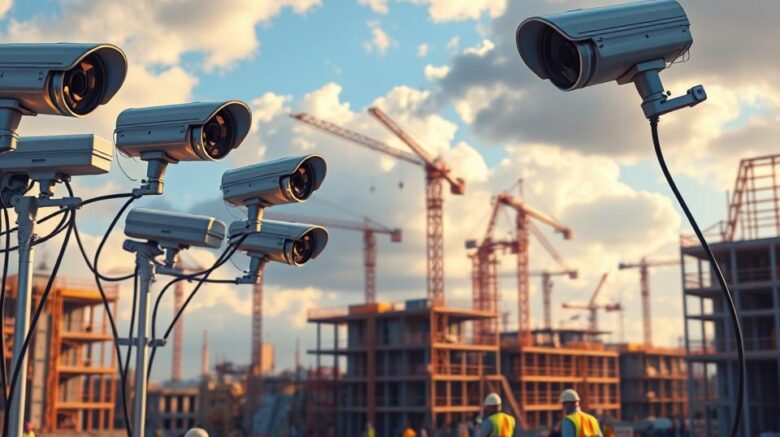Optimizing Protection with Hospital Security Guards
Did you know that hospitals face an average of 30 violent incidents daily? This startling data emphasizes how vital Hospital Security Guards are. They protect not just patients but also staff and confidential information. In today’s fast-changing healthcare world, robust Healthcare Facility Security is key. It involves establishing secure environments where patients receive care free from violence or privacy risks.
Working closely with seasoned providers like Divine Protection Services boosts Medical Center Security Services. This guarantees that security remains foremost while maintaining accessibility. This guide looks at how vehicle patrol security guards approaches and monitoring tools can markedly upgrade safety measures. It deals with both internal and external risks competently.

Core Takeaways
- Hospital Security Guards serve a critical function in shielding patients, employees, and private data.
- Healthcare Facility Security is key to preventing violence and securing privacy.
- Integrated security solutions amplify the overall performance of hospital security services.
- Partnering with companies such as Divine Protection Services delivers personalized security strategies.
- State-of-the-art technologies are the foundation of present-day healthcare security solutions.
- Managing openness and privacy is crucial for efficient hospital security standards.
The Importance of Hospital Security
Hospital security is paramount for the well-being of patients and staff and the defense of sensitive data. The increase in aggression within healthcare facilities underscores the necessity for robust Hospital Security Guards. Such officers play a key role in ensuring a safe environment and maintaining the rights and dignity of each individual.
Enforcing robust Healthcare Facility Security plans is fundamental to stop violent behavior. This supports the creation of a compassionate space, elevating the patient and family experience. It moreover confirms compliance with standards like HIPAA, mandating secure access management to defend Protected Health Information (PHI). These actions not only defend patients but also nurture trust between healthcare teams and their communities.
| Type of Security Measure | Value | Compliance with Regulations |
|---|---|---|
| Access Control Systems | Limit unapproved entry and permissions | Vital for meeting HIPAA requirements |
| Surveillance Cameras | Oversee actions and discourage wrongdoing | Aids in meeting safety regulations |
| Emergency Response Plans | Offer immediate action during crises | Compliant with safety and emergency management guidelines |
| Training for Security Personnel | Equip staff with skills to handle crises | Guarantees adherence to security standards |
Investing in robust security measures and training for personnel is essential for protecting hospitals and healthcare settings. These procedures create a secure and regulation-adherent space, crucial for providing excellent patient care.
Role of Hospital Security Guards
Hospital security guards play a vital role in keeping healthcare facilities safe. They oversee entry points to deter unauthorized access, manage emergencies, and employ conflict resolution to avert dangers. After receiving instruction from Divine Protection Services, they detect and handle signs of aggression or unrest.
Their presence is key to the safety and well-being of patients and staff. They protect the hospital’s operations, essential for a healing environment. By delivering security, they enrich patient care and lower risks.
Advanced Technologies in Hospital Security
Current healthcare facilities incorporate Advanced Technologies to enhance security efforts. Medical Center Security Services skillfully combine technologies such as AI-enabled cameras to boost monitoring functions. Such cameras provide live tracking and analytics, allowing teams to detect and address risks promptly.
A major element in Healthcare Security Solutions involves deploying access control systems. These platforms confine access to secure zones, assuring that only credentialed staff reach important areas. By employing biometric authentication, hospitals can add an extra layer of security to patient information and valuable medical equipment.
Artificial intelligence security applications are pivotal for physical safeguarding. Facial recognition and behavior detection enable security personnel to respond promptly to security breaches. High-level video analytics aids in operational choices, offering nonstop monitoring of hospital premises. This cultivates a secure space for personnel and patients.
| Technology | Deployment | Gains |
|---|---|---|
| AI-driven Surveillance | Real-time monitoring | Immediate threat identification |
| Access Control Systems | Regulated entry | Securing critical zones |
| Facial Recognition | Identifying individuals | Preventing unauthorized access |
| Video Analytics | Operational oversight | Informed operational choices |
Leading Technologies do more than guard hospital resources—they also build a protected atmosphere for all. By investing in these cutting-edge tools, healthcare facilities can remain vigilant against security threats. This guarantees top-tier patient care.
Medical Center Security Strategies
Effective Healthcare Facility Security strategies are essential for safeguarding patients, staff, and visitors in medical centers. Carrying out in-depth risk reviews is the bedrock of these methods. By detecting flaws, healthcare institutions can formulate specialized plans for various cases. This elevates their preparedness for any possible incidents.
It’s crucial to promote the reporting of suspicious activities and dangers. Medical centers need frameworks in place to react swiftly to those reports. This proactive view in Healthcare Facility Security cultivates a culture of shared safety.
Overseeing guest access is a vital part of Medical Center Security Services. Verifying that only approved individuals enter sustains a protected environment. Watching over patient-caregiver interactions helps diminish risks. This creates a safer space for all. Here is a table summarizing essential parts of robust security strategies.
| Security Element | Overview | Advantages |
|---|---|---|
| Risk Assessments | Spotting weaknesses and evaluating potential hazards. | Boosts preparedness and response efficiency. |
| Incident Reporting | Motivating staff and visitors to flag unusual behavior. | Supports quick reactions to dangers and boosts awareness. |
| Visitor Management | Guidelines for supervising and restricting access to sites. | Fortifies security and lessens unapproved entry. |
| Staff Training | Ensuring staff receive comprehensive security training. | Arms employees with skills for responding to security situations. |
Educating Security Staff Properly
Effective training for healthcare security personnel is key to maintaining safety in hospitals. Ongoing learning aids employees in adjusting to emerging threats. It further enhances their capacity to react effectively in varied scenarios.
‘Divine Protection Services’ emphasizes developing strong situational awareness in security personnel. This involves acquiring de-escalation abilities for stressful engagements. Ongoing simulations and training exercises solidify guidelines. Teams are trained to address dangers effectively while preserving dignity and respect.
This style of coaching security personnel surpasses simple defensive measures. It nurtures a culture of protection and expertise in hospital settings. By emphasizing essential skills, medical centers guarantee their security staff can face threats competently.
Conforming to Regulatory Criteria
Meeting Regulatory Standards is vital for hospitals seeking security and trust. HIPAA, in particular, demands secure entry controls to shield Patient Health Information (PHI). Such measures block illicit entry and prevent data breaches.
Medical centers can enhance their compliance by implementing comprehensive policies. They comprise frequent evaluations, staff development, and unambiguous incident reporting workflows. These steps not only ensure patient well-being but also foster community confidence.
Companies like Divine Protection Services offer specialized compliance strategies for healthcare facilities. Their expertise in Hospital Security Services ensures that security teams are well-trained to meet regulatory standards.
Devotion to compliance mitigates risks and fosters solid patient-provider bonds. An anticipatory approach to regulations advantages the whole healthcare framework.
Hospital Security Guards in Action
Hospital Security Personnel play an essential role in preserving medical facility safety. Their work is seen in many real-life situations, showing their proactive approach. In one case, they address altercations in reception areas, promptly de-escalating them to impede violence.
In tense moments, these officers escort individuals to safe places, supporting them in their time of need. This action not only safeguards those in distress but also helps maintain a calm atmosphere. Their teamwork with law enforcement in emergencies emphasizes the value of Professional Healthcare Security. They often serve as the first line of response.
Instruction from Divine Protection Services equips these guards to manage crises effectively. They gain abilities to implement rules while safeguarding everyone’s dignity. This combination of authority and empathy makes them key members of the healthcare team. They work to ensure safety and security for everyone in the facility.
Personalizing Security Solutions for Healthcare Settings
Hospitals deal with particular security threats that call for a bespoke strategy. Customizing Security Solutions is key to effectively tackling these issues, ensuring a safe space for both patients and staff. Working with experts like Divine Protection Services enables hospitals to create security programs that fit their specific needs.
An all-encompassing security framework includes key topics like violence control and pharmaceutical security. By leveraging cutting-edge technology, hospitals can improve their security approaches while meeting HIPAA requirements. This typically involves visitor screening platforms and adaptable access control systems to suit changing requirements.
The role of Medical Facility Guards is also vital. They benefit from targeted training to deal with security episodes and ensure sustained vigilance. Their visibility deters potential threats and instills confidence in employees and patients.
Below is a table illustrating how Tailoring Security Solutions meets different healthcare challenges:
| Challenge | Custom Solution |
|---|---|
| Violence Prevention | Coaching Medical Facility Guards in calming and negotiation tactics |
| Medication Security | Implementing locked pharmaceutical storage and tracking mechanisms |
| Visitor Management | High-level visitor vetting and credential issuance procedures |
| Access Control | Dynamic access control solutions responsive to hospital usage patterns |
By strategic preparation and teaming up with the appropriate entities, hospitals can create a robust security framework. This is achieved through Customizing Security Solutions to their unique requirements. Combining human oversight with technology significantly improves safety, leading to a more secure and efficient healthcare setting.
The Final Word
Guaranteeing the protection and welfare of patients, employees, and private data is essential in medical centers. Hospital Security Guards today employ cutting-edge technologies and instruction to fight contemporary risks. This progression not only protects physical areas but also builds confidence between patients and medical teams.
Personalized Healthcare Security Solutions allow hospitals to excel in the shifting security terrain. Partnering with experienced firms like Divine Protection Services equips healthcare facilities to handle safety concerns effectively. By blending personnel training with cutting-edge technology, hospitals can foster a secure environment for healing and care.
The health sector grapples with escalating risks, making professional security steps vital. Hospitals have to integrate these progressing strategies to fortify their environments and uphold operational honor.
